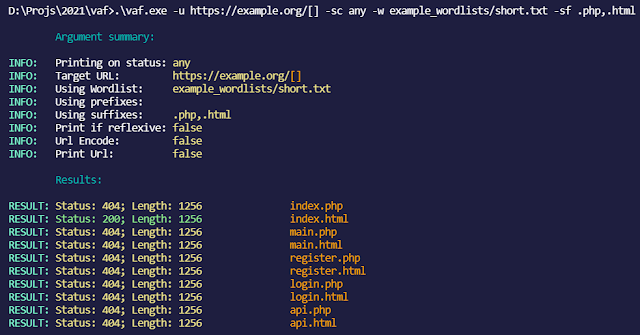very advanced fuzzer
compiling
- Install nim from nim-lang.org
- Run
nimble buildA vaf.exe file will be created in your directory ready to be used
using vaf is simple, here's the current help text:
Usage:
vaf - very advanced fuzzer [options]
Options:
-h, --help
-u, --url=URL choose url, replace area to fuzz with []
-w, --wordlist=WORDLIST choose the wordlist to use
-sc, --status=STATUS set on which status to print, set this param to 'any' to print on any status (default: 200)
-pr, --prefix=PREFIX prefix, e.g. set this to / for content discovery if your url doesnt have a / at the end (default: )
-sf, --suffix=SUFFIX suffix, e.g. use this for extensions if you are doing content discovery (default: )
-pd, --postdata=POSTDATA only used if '-m post' is set (default: {})
-m, --method=METHOD suffix, e.g. use this for extensions if you are doing content discovery (default: get)
-pif, --printifreflexive print only if the output reflected in the page, useful for finding xss
-ue, --urlencode url encode the payloads
-pu, --printurl prints the url that has been requested
screenshots
(with every status code printed, suffixes .php,.html and no prefixes)
(with url printed, every status code printed, suffixes .php,.html and no prefixes)
examples
Fuzz post data:
vaf.exe -w example_wordlists\short.txt -u https://jsonplaceholder.typicode.com/posts -m post -sc 201 -pd "{\"title\": \"[]\"}"
Fuzz GET URLs
vaf.exe -w example_wordlists\short.txt -u https://example.org/[] -sf .html
tips
- Add a trailing
,in the suffixes or prefixes argument to try the word without any suffix/prefix like this:-pf .php,or-sf .php, - Use
-pifwith a bunch of xss payloads as the wordlist to find XSS - Make an issue if you want to suggest a feature



